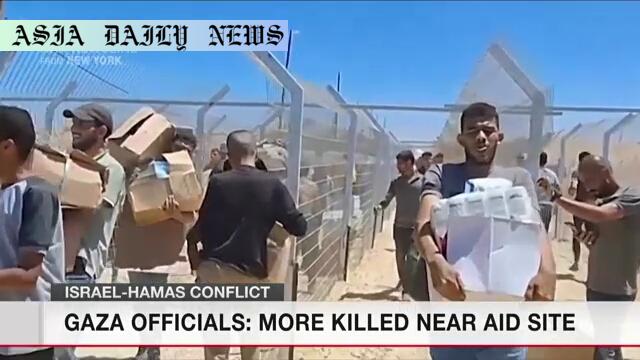Gaza authorities report fatalities and injuries near Rafah aid site amidst escalating Israeli military operations.

Israeli Attack Near Rafah Aid Site Leaves Several Casualties
On Monday, local authorities in Gaza reported a deadly incident near the aid distribution center in Rafah. According to their statements, three individuals lost their lives while 35 others suffered injuries due to what was described as an Israeli military strike. Such incidents continue to cast a grim shadow over a region already plagued by intense conflict. The Rafah attack came just a day after reports claimed that Israeli troops had killed 31 people in the same area, further heightening tensions on the ground.
Israel Expands Ground Operations and Intensifies Military Offensive
The Israel Defense Forces (IDF) have stated that their campaigns in Gaza are unfolding with expanded ground operations aimed at dismantling Hamas infrastructure. Reportedly, their efforts are targeting both above-ground facilities and the intricate network of tunnels below the territory. This strategy reflects Israel’s ongoing attempt to incapacitate Hamas as a governing entity and militant force. However, the collateral damage of these operations, particularly regarding civilian casualties, raises severe questions on proportionality and adherence to international humanitarian norms.
Humanitarian Challenges Amid the Escalating Crisis
Simultaneously, humanitarian challenges in Gaza escalate as residents grapple with scarce resources. The US-backed Gaza Humanitarian Foundation has stepped in to provide aid. However, their operations remain overshadowed by reports of violence and devastation. While the foundation denies any fatalities or injuries during its distribution efforts, the broader risks facing Palestinians in desperate search of food and resources cannot be ignored. The United Nations’ Secretary-General Antonio Guterres has emphasized that no one should risk their lives to secure sustenance and has called for independent investigations into such incidents.
Prospects for Ceasefire Talks Amid Continuing Tensions
In the face of this intensifying violence, a sliver of diplomatic hope emerged as Hamas expressed readiness for indirect negotiations with Israel concerning a ceasefire. However, with both parties deeply entrenched in their positions, substantial progress appears unlikely in the immediate term. While talks of peace are welcomed, their successful execution requires genuine concessions from both sides, something that past negotiations have rarely achieved. The international community’s role in mediating these processes may prove pivotal.
Need for Oversight and Global Involvement
As the conflict between Israel and Hamas continues to claim innocent lives, the need for oversight and international involvement has never been more critical. Calls for an independent inquiry are growing louder, with organizations and leaders urging transparency concerning actions that cause civilian casualties. With world powers such as the United States backing humanitarian foundations and other nations monitoring the situation closely, international pressure on both Israel and Hamas could escalate, demanding accountability and adherence to the rules of warfare.
Commentary
Humanitarian Concerns Amid the Escalation
The situation in Gaza continues to draw global attention, with each passing day unveiling tales of tragedy and resilience. The recent Israeli attack near Rafah’s aid distribution site underscores the larger humanitarian strain unfolding across the region. Incidents like this challenge the collective conscience of the global community: How can we ensure that fundamental human rights, including access to sustenance, are protected amidst a conflict that shows no signs of abating?
Balancing Security and Humanitarian Needs
While Israel has justified its intensified military campaign as a means to dismantle Hamas’ infrastructure, the repercussions of its actions on Gaza’s civilian population are impossible to overlook. Striking the right balance between security and humanitarian needs is a challenge that no party has conclusively addressed. Civilians caught in the crossfire often pay the heaviest price, and their suffering raises questions about both the means and ends of such aggressive strategies.
The International Community’s Role
The role of the international community amid this crisis cannot be overstated. From mediating ceasefire talks to ensuring humanitarian corridors remain open, global stakeholders have a responsibility to prioritally address human suffering. Independent investigations, as urged by UN Secretary-General Guterres, must be transparent and thorough, clearly delineating accountability and adhering to the principles of justice. Equally important is the reinforcement of diplomatic interventions to carve out sustainable solutions that prioritize peace and stability over recurring hostilities.
A Call for Lasting Peace
Ultimately, the path forward must embrace the voices of those most affected: the civilians yearning for a life free from conflict. While any immediate resolution may seem distant, fostering dialogue, promoting accountability, and delivering humanitarian support remain pressing imperatives. It is the collective responsibility of governments, NGOs, and global citizens to sustain their advocacy for a peaceful and equitable resolution in Gaza.


